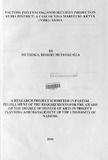| dc.description.abstract | Kenya is one of the four countries in Africa selected by United Nations to pilot the fulfillment of the Millennium Development Goals. Kenya has fertile soils and good rainfall making her one of the world's leading exporters of tea, coffee and vegetables. However, despite its high-production capacity, 17 million of Kenya's estimated 40 million people live on less than 1 US dollar per day and suffer poverty and malnourishment, with about one-third being chronically undernourished. In Kuria District, 25% of the population suffered starvation in 2009 and it is still projected that there is food insecurity, yet the goal of NMK is to fight food insecurity.
The purpose of this study was to establish the factors influencing food security among small-scale farmers in Kuria District with specific focus on the culture, environmental factors and socioeconomic factors of the people of Kuria District. A cross-sectional research design was used for this study. A sample of 240 respondents was selected from 638 members of all the 30 NMK farmer groups.
Data for the study was collected using questionnaires, interviews (Key Informants) and Focused Group Discussions. The study established that culture of the local community; environmental factors and socio-economic factors affect food security among NMK farmer groups in Kuria District. Based on these findings, it was concluded that socioeconomic factors are the one most significant factor that influence food security among NMK farmer groups in Kuria District. Culture, and its associated practices and beliefs, are determinants of the way in which natural resources are accessed and used in Kuria district. The beliefs people and individuals hold about food and how that food is produced influences food security.
Environmental factors also influence food security since food production requires land and favourable weather conditions.
The study recommends that the government makes concerted effort to mobilize the community to improve literacy by taking advantage of free primary and secondary education and other informal trainings; that the Ministry of Agriculture introduce savings and credit organizations and soft loan schemes at the village level to enable farmers to purchase farm inputs such as certified seeds, fertilizers, farm implements and agro-chemicals. Extension services should be intensified to educate the farmers on modern land management and agriculture production techniques.
The study also recommends that the Ministry of Agriculture uses the local administration and introduce programmes to take advantage of the positive culture to influence agricultural production in the area such as introducing new crop varieties that are drought resistant and with short maturity periods. Lastly, the study suggests that a study be conducted to quantify the actual effect or contribution of culture, environmental factors and socioeconomic status on the food security among NMK farmer groups in Kuria District. | en_US |

